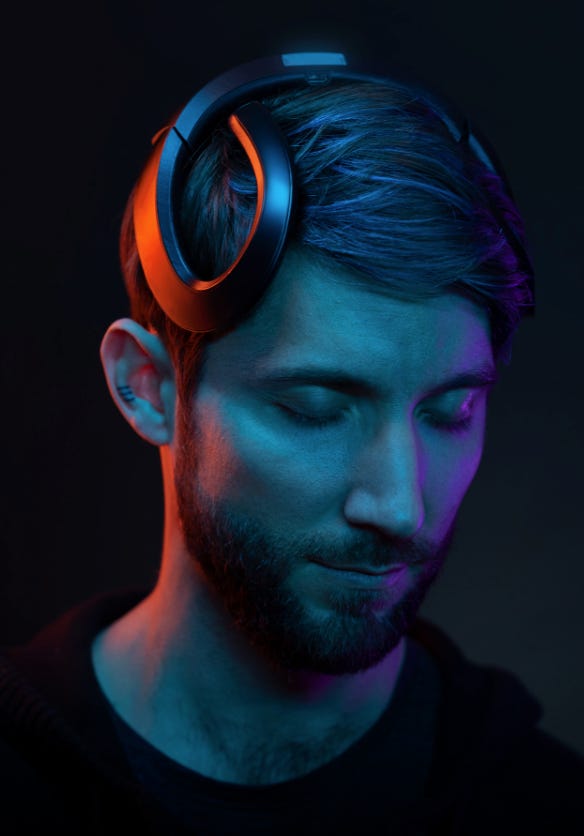Personal Science Week - 09 Feb 2023
Improve deep sleep, free studies, and stuff people sent me
This is a weekly summary, delivered each Thursday, of ideas we think will be useful to aspiring Personal Scientists, those of us who want to use science for personal rather than professional reasons.
This week we discuss an app that claims to improve deep sleep, and point you to some studies you can join for free.
Can I improve my deep sleep?
I first met sleep expert Dan Gartenberg at the 2015 Quantified Self Conference, where he described a new sleep technology that could lengthen the amount of time a person spends in deep sleep, the most restorative kind. Play the right sound wavelength at the right time, and the sleeping brain is tricked into longer deep sleep. I tried an early version of his app back then and found anecdotally that it seemed to help me sleep better, but it was difficult to use and annoyed my light-sleeping wife.
Now after many iterations, Dan’s company SleepSpace offers a much-improved version that integrates with the Apple Watch to more accurately spot the period of deep sleep. I tested it for two months and found that yes, it seems to work. This plot shows that I averaged more than 30 minutes extra of deep sleep on nights that I use SleepSpace than on nights when I don’t. (Recall that a boxplot is a way of showing information where 3/4ths of the data points are contained within the colored portion of the box, the horizontal line across the middle represents the median, and the vertical lines go from the minimum to the maximum, with the dot representing significant outliers).

Okay, there’s a catch: your phone has to be turned on and ready to blast a special humming noise at you while you sleep. You won’t notice, but your sleeping partner might, so it probably works best if you sleep alone. My wife and I are blissfully inseparable (for better or worse) so it’s rare that I’m able to test the system under ideal conditions — usually I have the sound turned way down. When I tried at higher volumes during business and other trips when I was alone, I still found an effect but couldn’t collect enough data points to prove it statistically.
You can read more details about my experiments, including the source code for my analysis here:
Join this sleep study
SleepSpace and Neurosity are recruiting people to test an EEG-sensing headset (the Neurosity “Crown”). Although I’ve used SleepSpace for many years, I’ve not tried the Neurosity yet, so this is a chance to see if this wearable can “improve your productivity and boost the brain’s concentration”. Apparently it plays music that shifts in a scientifically-programmed way to stimulate better cognitive performance. If that sounds intriguing, sign up for their 2-week study here. If selected, they’ll give you the $300 headset and a year’s subscription to SleepSpace, plus a $50 gift card.
Update: Go ahead and click the links to double-check but now I’m told the study is full. Meanwhile click here for a 30-day free trial of SleepSpace.
Speaking of free studies
We discussed two free gut microbiome tests in Personal Science Week - 23 Jun 2022 and as far as I know they both continue to recruit. I tried both myself and received results as promised. I especially recommend http://nyufamili.org/
Personal Science Week - 01 Sep 2022 discussed a free government-run test you should sign up for immediately if you or anyone in your household tests positive for COVID.
Power is a well-done site that lets you search for clinical trials by condition, location, and drug type. With over 31,000 studies listed, you’re sure to find one of interest near you.
If you live in the Seattle Area, the NW Clinical Research Center hosts a dozen clinical trials on everything from migraines and Alzheimers to childhood ADHD and back pain. These are “serious” studies that require an in-person visit and months or years of regular follow-up, but if you’re looking for relief, they provide medical care and free medication for your participation.
Stuff People Send Me
I’ve not personally evaluated these, hence violating our rule of “take nobody’s word for it”, but the following were recommended by other Personal Scientists I trust. I will probably try them myself at some point:
Biooptimizers is a supplement company featured on a long list of podcasts and health gurus. I’ve been studying migraine remedies which often point to abnormal levels of magnesium as a cause, and this place sells a particularly well-regarded form for about $1/day.
Macadamia nut butter supposedly tastes way better than peanut butter, almond butter, or other alternatives. I haven’t tried it yet, but I heard the cheapest source is Costco.
A friend I trust recommends speaks highly of https://bioresetmedical.com/, a Bay Area concierge medical clinic. Consultations are not cheap (non-refundable $1000) for your first hour, but it’s worth it if — as my friend claims — it solves your problems.
If you have other recommendations or ideas, please email us at info@personalscience.com or leave a comment below.
About Personal Science
This is a weekly summary of ideas we think will be useful to anyone who wants to live according to the motto of the Royal Society, established in 1660: Nullius In Verba “take nobody’s word for it”. While weekly summaries like this one will always be free, premium subscribers have access to special content that won’t be visible to casual readers or to search engines, thus reducing the likelihood that some of our more esoteric ideas will fall into unprepared hands.


